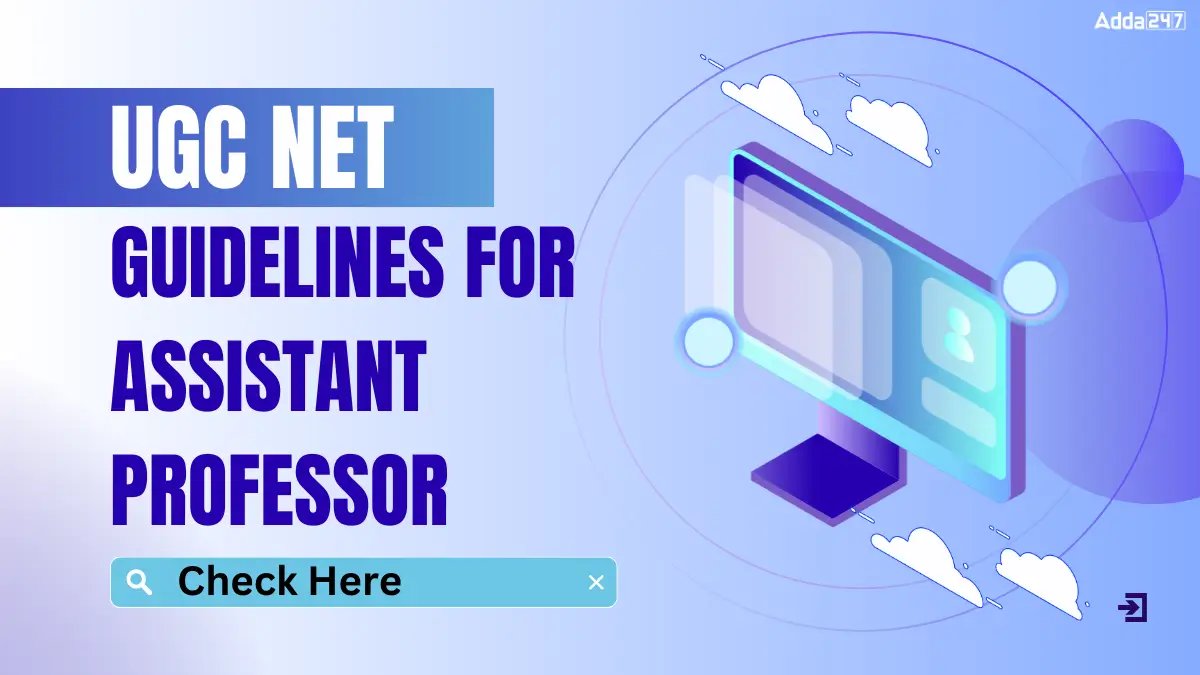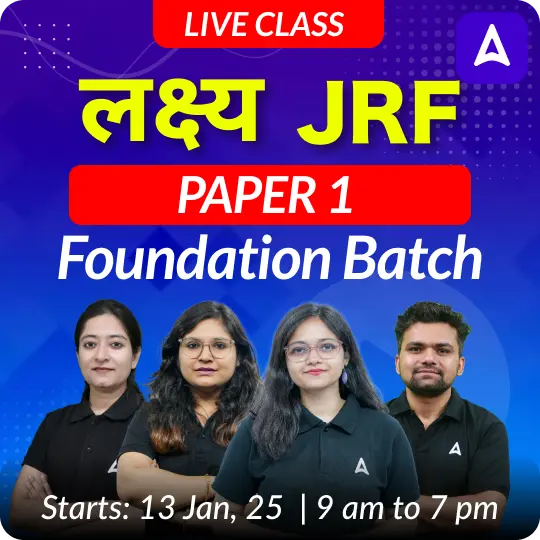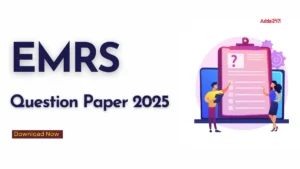Table of Contents
The University Grants Commission (UGC) has released a new draft with important changes for all universities and academic institutions across India. It includes updated rules for Assistant Professors, Vice-Chancellors’ appointments, and the role of NET. Since Assistant Professors are the entry-level position in higher education, special focus has been given to their appointment and promotion rules. Below, we explain the latest UGC NET rules for Assistant Professors.
UGC NET New Guidelines for Assistant Professor
UGC has introduced new guidelines for Assistant Professor recruitment and promotion in universities and academic institutions. These updated UGC regulations aim to enhance transparency, improve teaching and research standards, and create more opportunities for candidates from diverse fields. The revised UGC Assistant Professor eligibility criteria focus on inclusivity and a streamlined hiring process. Stay updated on the latest UGC norms to ensure compliance with higher education standards.
UGC NET Recruitment Process
The recruitment process for Assistant Professors is designed to ensure flexibility, transparency, and the selection of the best-qualified candidates. This provides equal opportunities for candidates across the nation, promoting diversity and merit-based recruitment.
- All-India Advertisement: Recruitment for Assistant Professors will be conducted through an all-India advertisement. This ensures that the process is transparent and that all eligible candidates across the country have an equal opportunity to apply. The advertisement will provide clear guidelines regarding the eligibility criteria, application process, and other important details, ensuring fairness and inclusivity in the recruitment process.
- Selection by Committee: A duly constituted selection committee will oversee the recruitment process. The committee will evaluate candidates based on merit, academic achievements, and relevant contributions in their respective disciplines. This ensures that only those candidates who are truly qualified and have made significant contributions to the field are selected for the position of Assistant Professor.
Is NET Required for Assistant Professor?
The eligibility for Assistant Professor positions depends on the candidate’s qualifications in the relevant discipline, including both their Ph.D. and NET/SET qualifications.
- Ph.D. Discipline Consideration: If the subject of the candidate’s undergraduate or postgraduate studies differs from their PhD discipline, the discipline of the PhD will determine Assistant Professor Eligibility.
- NET/SET Discipline Consideration: If the subject of the candidate’s undergraduate or postgraduate studies differs from their NET/SET qualification, the discipline in which they qualified UGC NET will determine their eligibility for Assistant Professor roles.
UGC Draft Changes Regarding PhD
The University Grants Commission (UGC) emphasizes its importance in promoting high-quality research and ensuring that faculty members meet the academic standards required for teaching at higher levels.
- Mandatory for Higher Levels: A PhD will be a mandatory qualification for promotion to higher academic levels such as Assistant Professor (Level 12), Associate Professor (Level 13A), and Professor (Level 14). This ensures that faculty members possess advanced research expertise and contribute significantly to the academic development of the institution. The PhD qualification supports faculty members in enhancing their subject knowledge and research capabilities, which directly benefit students and the academic community.
- Exemption for Pre-2009 Ph.D. Registrations: Candidates who registered for their PhD before July 11, 2009, are exempt from the requirement to clear NET/SLET/SET for Assistant Professor recruitment. This exemption is based on the understanding that their PhD degrees were by the institutional and UGC norms in place at that time. This rule aims to recognize the prior academic achievements of those who pursued their doctoral degrees before the introduction of NET/SLET/SET as a mandatory requirement.
Assistant Professor Experience and Study Leave
The UGC outlines specific guidelines regarding teaching experience during PhD and M.Phil. pursuits, as well as provisions for study leave to enhance academic qualifications.
- Experience Not Counted During Ph.D. or M.Phil.: The UGC regulations specify that the time spent pursuing an M.Phil. or Ph.D. degree will not be considered as teaching or research experience. This provision ensures that the eligibility criteria for recruitment and promotion remain focused on practical contributions and active involvement in academic responsibilities.
- Concurrent Teaching Experience: If a candidate pursues a PhD while actively teaching without taking any leave, the duration of this concurrent experience will be counted as valid teaching/research experience. This allows candidates to gain valuable academic experience and still pursue higher qualifications simultaneously, enhancing their career growth.
- Provision for Study Leave: Institutions are allowed to grant study leave to up to 20% of their faculty members. This leave can be used for pursuing Ph.D. degrees or other academic pursuits. The provision helps faculty members improve their qualifications while continuing to contribute to the institution’s educational development and research output.
Assistant Professor Growth & Promotions Process
The selection committee considers a range of notable contributions when recruiting and promoting Assistant Professors. Candidates must demonstrate expertise and achievements in at least four of the following nine areas, particularly in their relevant discipline:
- Innovative Teaching Contribution: Contributions to innovative teaching methods and tools are highly valued. This includes the development and implementation of new pedagogical approaches, interactive teaching aids, or unique ways of engaging students. Such contributions ensure that teaching methods align with contemporary educational standards and foster an engaging learning environment.
- Research or Teaching Lab Development: The development of well-equipped research or teaching laboratories is another essential contribution. This includes designing labs that enable cutting-edge research, facilitating hands-on learning experiences, or creating environments that support student innovation. Such contributions demonstrate an active commitment to enhancing academic resources.
- Consultancy/Sponsored Research Funding: Serving as a principal or co-principal investigator on research projects and securing consultancy or sponsored research funding is a major recognition. This showcases the candidate’s ability to collaborate with external entities, contribute to meaningful research, and attract funding that benefits the institution’s research capabilities.
- Teaching Contributions in Indian Languages: Candidates making significant contributions to teaching in Indian languages also stand out. This includes developing courses, materials, and methods in regional languages, thus preserving and promoting India’s linguistic diversity while making education accessible to a broader population.
- Teaching-Learning and Research in Indian Knowledge Systems: Contributions to the study and dissemination of Indian Knowledge Systems are encouraged. This may involve teaching, researching, and contributing to the promotion of traditional knowledge, ancient texts, and indigenous scientific methods. This aligns with the broader goals of integrating Indian knowledge into modern academia.
- Student Internship/Project Supervision: Supervising student internships or projects is a vital contribution. It includes guiding students through real-world applications of their studies, helping them gain practical skills and exposure. By supervising such activities, a professor can make a lasting impact on student careers and enhance their academic experience.
- Digital Content Creation for MOOCs: The creation of high-quality digital content for MOOCs (Massive Open Online Courses) is highly valued. Professors who develop online learning materials such as video lectures, assignments, or virtual simulations contribute to the global accessibility of education, enabling learning for a diverse set of students beyond geographical limitations.
- Community Engagement and Service: Active involvement in community service, whether through educational outreach programs, volunteer work, or social initiatives, is considered a key contribution. This reflects the candidate’s commitment to societal welfare and underscores the importance of education in promoting social change and inclusivity.
- Startup and Innovation: Founding a startup, especially one related to academia or research, is a highly regarded contribution. If the startup is registered with the Registrar of Companies (ROC) and successfully raises funding through government or venture funds, it demonstrates the candidate’s entrepreneurial spirit, innovative mindset, and capability to contribute to the broader economy.
Assistant Professors Promotions Stage wise
The Career Advancement Scheme (CAS) outlines clear guidelines for the career progression of Assistant Professors. The scheme is designed to recognize and reward the contributions of faculty members over time, ensuring that they have the opportunity to advance in their academic careers based on service and professional development. The table below outlines the specific requirements for each promotion level.
| Promotion Stage | Eligibility Criteria |
| Promotion from Academic Level 10 to Level 11 |
|
| Promotion from Academic Level 11 to Level 12 |
|
| Promotion from Academic Level 12 to Level 13A (Associate Professor) |
|
| UGC NET Related Articles | |
| UGC NET Notification 2025 | UGC NET Application Form 2025 |
| UGC NET Previous Year Question Paper | |




 MPESB Exam Calendar 2026 Out, Check Exam...
MPESB Exam Calendar 2026 Out, Check Exam...
 EMRS Question Paper 2025 Released, Downl...
EMRS Question Paper 2025 Released, Downl...
 UP LT Grade Teacher Answer Key 2025 Out,...
UP LT Grade Teacher Answer Key 2025 Out,...












